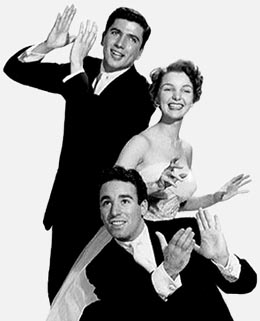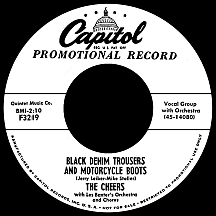THE CHEERS
Black Denim Trousers
and Motorcycle Boots
Getting established as major songwriters was a gradual process for Baltimore-born Jerry Leiber and Long Island, New York native Mike Stoller. Based in Los Angeles in the early 1950s, the team had a taste of success in early 1952 with "Hard Times," a minor rhythm and blues hit for Charles Brown, then broke through in a big way with "Hound Dog" by Willie Mae "Big Mama" Thornton, who interpreted the song "her way" (wildly primitive), and landed a number one R&B hit in the spring of 1953. Jerry and Mike further cemented their soon-to-be important role in rhythm and rock with The Robins, The Coasters and, through a stroke of good fortune, Elvis Presley (whose altered-for-rock interpretation of "Hound Dog" created a sensation in '56). As of 1954, though, these two white guys from the east coast hadn't yet achieved a hit outside the black community.
Enter a trio of singers from L.A., each struggling as solo artists, who joined forces as The Cheers and made an impact with a pair of Leiber and Stoller songs quite unlike the earlier R&B productions. Bert Convy, Sue Allen and Gil Garfield were somewhat unique as a two-man, one-woman act; Capitol Records took a chance and signed them. On paper, "(Bazoom) I Need Your Lovin'" wasn't nearly as compelling as earlier L&S creations, but the finished version, arranged and conducted by rookie orchestra leader Buddy Bregman, had a rock-and-rollish quality to it...and it was a bit provocative with lyrics like 'One night of heaven...that's all I ever got,' frequently punctuated with a boisterous 'Bazoom!' and Sue's sweetly sexy 'I need your lov-in'.' The record was a hit, spending several weeks in the top 20 in the fall of 1954 (a cover version by The Charms popped up on the R&B charts in January '55). Leiber and Stoller had broken through in the bigger money world of pop music, Bregman had positioned himself for greater things (he moved into the jazz field a year later, working with Ella Fitzgerald on a series of successful albums) and the Cheers were ready to dazzle with their next hit single.
Jerry and Mike came up with "Whadaya Want?," an energetic tune with a strong sax break. It tanked. Two more failed singles made them rethink the guy-girl-guy gimmick. For the fifth release, changes were made: Bregman was out, his replacement the more seasoned Les Baxter (already possessing a string of hits for Capitol), and Sue Allen's vocals were relegated to the background. "Black Denim Trousers and Motorcycle Boots" (sounding similar to Frankie Laine's five-year-old "The Cry of the Wild Goose") described a typically clichéd leather jacketed bad boy with '...axle grease embedded underneath his fingernails' and a heart-shaped tattoo saying 'Mother, I love you,' riding '...a hopped-up cycle that took off like a gun!' This frantic two-minute tale of the "Terror of Highway 101" ended in mystery ('...he hit a screamin' diesel'), insinuating, but not clearly stating, that the crash was a deadly one.

The record had already broken at radio when, on September 30, 1955, an auto accident took the life of 24-year-old actor James Dean. The tragedy fueled a public fascination with Dean that hasn't diminished with the passage of time. In spite of the headline-making story or perhaps because of it, "Black Denim Trousers" developed quickly, hitting the top ten within a few weeks. Other versions appeared, including one by The Diamonds and another by Vaughn Monroe that hit the top 40 in November. The song touched on a subject later explored to extreme through the popularity of "teen tragedy" hits that began in earnest with Mark Dinning's 1960 hit "Teen Angel." In 1956, Stoller and his wife, while on a European vacation he had financed with his royalties from "Bazoom," attended a concert performance at L'Olympia in Paris starring the great Édith Piaf. To his amazement she launched into a song that to him was both surreal and downright unfathomable: "L'homme a la Moto," a French-language version of "Black Denim Trousers and Motorcycle Boots"!
They attempted to milk the concept with the similar-sounding "Chicken," morbidly documenting the dangerous "I dare you to jump" car racing game popular among a segment of teenagers and glamorized somewhat in films, including - no surprise here - Rebel Without a Cause starring James Dean. It didn't catch on, nor did one final Capitol single, after which Leiber and Stoller and the trio parted ways. Convy recorded for Era Records fronting The Thunderbirds (one of several unrelated groups with that name) and, with the Cheers, had two singles on Mercury, the second credited to Bert Convy and the Cheers, suggesting Gil and Sue had moved on. Convy kept trying to add to his two-hit status with a 1958 Halloween novelty, "The Monsters Hop," and teen-oriented efforts on a number of small L.A.-based labels.
In later years, the Cheers each took distinctly different professional paths. Gil Garfield composed many pop songs, often working with Perry Botkin, Jr. The pair penned and produced Robin Ward's 1963 ode to seasonal romance, "Wonderful Summer." At some point he opted out of show business, making loads of money in real estate, which bankrolled his interests in collecting art and dabbling in a little painting of his own. Sue Allen continued singing and recording, putting in time with Ray Conniff and the Singers and Mel Torme's group The Mel-Tones. In the summer of 1978, nearly 22 years after her heyday with the Cheers, she racked up her third top 40 hit, "Chattanooga Choo Choo," as a member of disco group Tuxedo Junction.
Bert Convy turned to acting, appearing in more than a hundred TV dramas and comedies and a handful of theatrical films beginning in the late '50s and ending a few years before his unexpected death from a brain tumor in 1991. His bigger claim to fame was in television game shows, as a panelist and, more notably, as the host of several such series starting in 1974 with Tattletales. I once attended a taping of the show and sat in the infamous "Banana Section," winning my 13 dollar share of the prize money thanks to comedian Godfrey Cambridge and wife-he-knew-so-well Audrey. During a question-and-answer period with Bert during the pre-show warm-up, I considered asking him about The Cheers, but someone else beat me to it! It wasn't exactly a well-kept secret anyway and he was happy to talk about the beginning of his long show business career.


